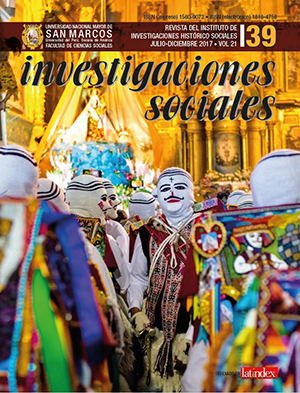Master Rowe and the origins of anthropological thinking
DOI:
https://doi.org/10.15381/is.v21i39.14667Keywords:
Jose de Acosta, Rowe, History of Anthropology, Theory of Progresso, Andes, MesoamericaAbstract
Rowe (1964) is, perhaps, who suggested before anyone - with a fine sense of historical time - that the Jesuit Acosta was the writer of Indias first establishing a temporal sequence in which some stages of cultural evolution ‘succession’ ones to others. The type present in the proem of his missionary treat ise (De Procuranda Indorum salute, 1588) is ‘historized’ only in his history of 1590, precisely to the encounter with Mexican traditions about his past by contrast chichimecas, which Acosta perceived as ‘parallel’ to Inca traditions about the ‘chunchos’ of the Andes. In the following year published Rowe a general reflection on ‘the Renaissance origins of Anthropology’ (American Anthropologist, 1965): what mattered in this discipline was having destroyed ethnocentrism Christian to see other cultures, and that the admiration and new translation of the Italian humanists of the 14th and 15th centuries the texts and classic monunentos, product of a non-Christian culture. I found a reef interpretation in these two articles (1964, 1965) to construct a building anthropological P. Acosta, affiliating with the current humanist rather than trusting their ethnographic data (mostly borrowed).Downloads
Published
Issue
Section
License
Copyright (c) 2018 Fermin del Pino Díaz

This work is licensed under a Creative Commons Attribution-NonCommercial-ShareAlike 4.0 International License.
AUTHORS RETAIN THEIR RIGHTS:
a. Authors retain their trade mark rights and patent, and also on any process or procedure described in the article.
b. Authors retain their right to share, copy, distribute, perform and publicly communicate their article (eg, to place their article in an institutional repository or publish it in a book), with an acknowledgment of its initial publication in Investigaciones Sociales.
c. Authors retain theirs right to make a subsequent publication of their work, to use the article or any part thereof (eg a compilation of his papers, lecture notes, thesis, or a book), always indicating the source of publication (the originator of the work, journal, volume, number and date).













